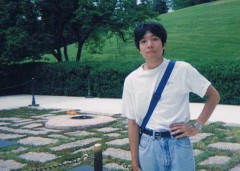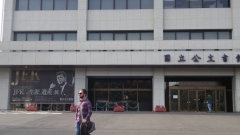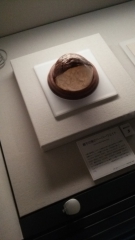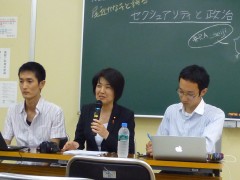11 May 2016
French film "Une Nouvelle Amie (The New Girlfriend)" Gender Identity & Sexual Orientation
The story of the film reminds me of American transwoman, Caitlyn Jenner, who was a Olympic gold medalist named Bruce Jenner.
He turned himself to be a woman at the age of 65 but her sexual preference was the same as before. She loves women.
The story started with a funeral scene and a woman named Claire who lost her bestfriend making a speech.
Her late bestfriend, Laura had been married and had a girl. One day Claire entered Laura's house and saw David, husband of Laura, dressed in woman cloth.
Claire was at first upset but later gradually accepting his feminine part and then attracted to him being a woman. In the end, the two fell in love with each other as two women.
Gender Identity and Sexual Orientation are two seperate matters. Never interlook each other.
The movie is about what is a big deal about gender and sexual orientation.
The actor who played David was excellent in terms of casting and his act as transwoman.
He was kind of a bi-sexual or neutral person but never disgusting. He was beautifully musculine as well as feminine.
In Japan it is said Gods or Buddha are asexual. Gender is what we, humanity defines.
Last week I attended one of LBGT events set forth for Tokyo Rainbow Parade 2016 held on 8 of May. The event was discussion on how family members of LGBT deal with their LGBT member and society. I met a Korean American woman whose daughter turned herself into male at the age of 16. She said she was encouraged by Jenner's coming out and was glad that her son could do the same much earlier age.
As the theme in this movie has become common recently, LGBT lifestyle has become more socially acceptable.
We may be living in a greatest transition period.
P.S. The French song, "Une femme avec moi" was just excellent as the movie as a whole.
22 April 2015
Dear Fellow Americans, JFK Exhibit is held in Tokyo
I went to the exhibition of John Fitzgerald Kennedy at National Archives of Japan located near the Imperial Palace in Tokyo.
I went there with one old American couple whose young days were when JFK were alive as US President. They told me that the assassination was shocking to them because he was very popular at that time.
The admission was free. It has been held since early March and is scheduled to end May 10, 2015. The description of exhibits are mostly Japanese. So I explained to them what each one of exhibits was about. Actually they knew what they were because those things were very familiar with them already.
I focused on one corner. The exhibits that relate to his relationship with Japan before he became a politician.
A cononut paperweight and a letter to former enemy.
These things come from his war-time experience in Solomon islands, Southern Pacific 1943. JFK was on torpedo patrol boat with his crews at night. The boat was hit by Japanese naval destroyer, Amagiri and sunk. JFK and his men were all thrown out to the sea but they swam to one island. There they met locals. JFK asked them to deliver a coconut which the message of calling for help was written on to the US military corp. Then he and his men were all saved. By that incident JFK was awarded medals.
After the war, JFK made the coconut into paperweight as a memorial. JFK wrote the letter to former captain of the destroyer, Hanami telling him that he wanted to meet the captain because yesterday’s enemy turned today’s friend. Later JFK invited him to his presidential election campaign. The captain could not go to the US but his best friend, Onozaki, who was also a crew of the destroyer went. The photo that Onozaki and JFK together were printed out in newspapers in US that might help JFK win the election.
He might have felt saved by the Japanese military. I speculate that the enemy did not shoot at them though they found them in the sea or even gave them a rescue boat or some way to save their lives?
JFK to me has weird relation. When I was in US two decades ago as a college student, some of my classmates said to me that I look like JFK. I was glad to hear that.
I remember when I went to Arlington cemetery in Washington, I could come to his grave without knowing the route, seemed like he invited me.

He and I have things in common. I am Catholic and have back pain problem from young days still struggling with it some time. He and I are very much interested in civil rights advocacy.
The memorable thing I saw in the exhibit was his speech film on Civil Right Act in relation to Alabama state’s defiance to Federal court order to admit Afro-American students to its state university.
He said,
“We preach freedom around the world, and we mean it, and we cherish our freedom here at home, but are we to say to the world, and much more importantly, to each other that this is the land of the free except for the Negroes; that we have no second-class citizens except Negroes; that we have no class or caste system, no ghettoes, no master race except with respect to Negroes?
Now the time has come for this Nation to fulfill its promise. The events in Birmingham and elsewhere have so increased the cries for equality that no city or State or legislative body can prudently choose to ignore them.
The fires of frustration and discord are burning in every city, North and South, where legal remedies are not at hand. Redress is sought in the streets, in demonstrations, parades, and protests which create tensions and threaten violence and threaten lives.
We face, therefore, a moral crisis as a country and as a people. It cannot be met by repressive police action. It cannot be left to increased demonstrations in the streets. It cannot be quieted by token moves or talk. It is time to act in the Congress, in your State and local legislative body and, above all, in all of our daily lives.”
That speech sounds like current President Mr. Obama’s endorsement on gay marriage.
After a half century, a new type of civil rights movement seems to be on. The same rhetoric are used for both pros and cons. Majorities vs. Minorities. Conservatives vs. Liberals.
Federal protection law to ban discrimination based on sexual orientation and gender identity has been on debate.
Just like that State of Alabama rejected court order to provide marriage licenses to gay couples.
That is why Obama is called, Black Kennedy. He succeeded JFK’s will to protect civil rights.
Interestingly enough, unlike race matter, sexual orientation matter is common worldwide. So America can be a good role model for this issue.
In relation to it, this coming weekend April 25 & 26, 2015, Tokyo celebrates gay pride event in Yoyogi Park that includes street parade. I will actually join it. Last March one ward of Tokyo, Shibuya passed an ordinance that provides partnership certificate to gay couples. The first political accomplishment in Japan’s gay movement.
Japan’s public opinion regarding gay issue has recently changed.
According to the recent poll conducted by Mainichi Newspaper, majority of Japanese support gay rights, especially among younger generation. More people approve of gay marriage than those who oppose it.
Is it due to what has happened recently in the U.S. ?
Good role model. Hope US keep being good role model for us.
Since I think of JFK, there are 3 songs that come up with. The songs released in the year he was assassinated. Did he hear the songs and enjoy them?
One is related to civil rights movement, "Blowing in the wind", one implies coming of Vietnam war, "Green Green." The other implies the oppression I am facing with many other people regarding US policy which current US Ambassador to Japan, Caroline Kennedy (JFK’s daughter) has to deal with.
15:16 Posted in Japan News, Music, Politics, Tokyo Life, US-Japan relationship | Permalink | Comments (0) | Tags: history, jfk, war, homosexuality, gay, lesbian, college days
20 June 2013
Attended the Speech meeting of Japan's first openly gay parliament member
Her name is Kanako Otsuji. She is now 38 years old. Last month she obtained the seat for Japan's upper house parliament.
On 18 of June, she made a speech in the meeting titled "Sexuality and Politics" held by Rainbow Action group, at Nakano Zero Hall in Tokyo. Around 60 people including me attended the meeting.
She was a candidate for that position in the election held 5 years and 10 months ago. She was listed in candidate list of nation-wide proportional representation constituency for one of Japan's major political party, Democratic Party of Japan. That was very first time in Japan's history that a major party nominates openly gay person as its candidate. She gathered some votes but could not reach passing border line. However, after more than 5 years, only 2 months left until the end of the term, she got to the position because several members died or resigned from the parliament. Kind of strange incident.
In the speech she talked about profile and how she is doing now. She used to be a member of prefecture congress in Osaka. She came out during that time. She is now actively working as a national parliament member and got involved in many law-making tasks. She recently was invited to and then attended a sexual minority's meeting held in US embassy in Tokyo.
I asked her how Japan can be changed in terms of this issue since Japan is different from western nations in the sense that Japan is not advanced in minority rights issues.
Her reply was, those nations and Japan have things in common that are practicing democracy. Democracy does not necessarily mean majority of people make the rule. Everyone has decision making right. We can make changes by making laws. Japan can change drastically when the time comes. Japan is not very religious like western nations. We are rather concerned about peer pressure matters.
That may be right, I think. According to the Reuter news report, the world-wide survey on ordinary citizens opinion about gay issue revealed Japan is as open-minded as western nations. Especially, younger generations' supporting rate for gays was higher than that of US.
Is it due to the recent gay liberation movement? That may not be a major cause. As she described Japan's morale standard is based on peer pressure. Homosexuality has been considered abnormal in this society but never been considered sin like Christian societies in the West. In fact histricaly Japanese society tolerated gay relationship until premodern time ended. Details in this post.
Furthermore, when we acquire new things, we can change very rapidly like late 19th century's industrialization or reconstrution after the second world war.
Ms. Otsuji said even after entry of parliament, she never experienced any harrassment by other people in the house. People are friendly and trusting her very well.
Thanks to her, her outing of what she is helps our nation progress further, to more democratic and civilized. She is the proof of our democracy, freedom and flexible culture. I am proud of her. We all should be proud of her.
00:48 Posted in Japan News, Politics, Society, Tokyo Life | Permalink | Comments (0) | Tags: gay, homosexuality, lesbian
23 October 2011
True lesbian story "Юрико, до свидания."
The title is Russian but it is Japanese film about two Japanese women who had a sexual relationship in 1920's. It means "Yuriko, Good-bye!."
One of them is Yoshiko Yuasa, who was a translator for Russian literature. The other is Yuriko Nakajo, a novelist. They met in Tokyo and started to have sexual relationship and then travelled to Moscow together to study Russian.
Can you believe women in those days had relationship like today's gay couple? Indeed they did. They did it openly. Japan in those days was much more male chevinist society than today. Women did not have rights to vote. Women were expected to get married to men which their parents designated and work at home. But they could not resist passion they shared with each other.
The couple had 3 years of relationship and aparted. Yuriko later married a communist activist and then after the war, she became a leading figure of post-wolrd-war-2 democratic movement. She was actually a bi-sexual woman whereas Yoshiko was truly lesbian woman who had relationship with Geisha woman before she met Yuriko.
I went to see the movie on the first showing in Tokyo. The director, Sachi Hamano, and two actresses who played the couple appeared on the stage before the showing. The actresses were very pretty. Their act, especially lesbian sex scene was very fantastic and erotic.
There were viewers from foreign countries at the theatre. I don't know if they understood the language. I think they should be more curious than Japanese viewers were.
The film itself was great one although it did not describe their life in Moscow. The film was mainly about how they met and developed relationship before they went to Moscow.
I wonder if this film is shown in foreign country or translated version of it is produced.
Translated version should be like two western women met in London or Berlin and travelled to Moscow in 1920's or 1930's. Living together there in the cold Moscow. I recommend Nicole Kidman, or Jodie Foster to play the two.
The below is preview of the film (Only Japanese).
13:29 Posted in Film, Japan News, Society | Permalink | Comments (0) | Tags: literature, history, lesbian, feminism, women, homosexuality, russia








